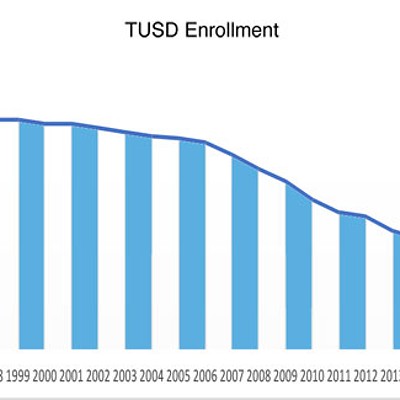Project White House candidates set out to change America by running for president.
Instead, it appears as if they're on the verge of changing state law—to ensure that frivolous candidates never again darken the Arizona presidential-preference ballot.
House Bill 2379 sailed through the Senate Judiciary Committee on an 8-0 vote on Monday, March 5. The legislation, which includes a variety of changes to election law, includes a requirement that any candidate seeking to run in Arizona's presidential primary get at least 1,000 signatures on nominating petitions, be on the ballot in at least 20 other states, or be qualified for federal matching funds for presidential campaigns.
Under current law, candidates merely have to fill out a two-page form and have it notarized in order to appear on the ballot, which inspired the Tucson Weekly to sponsor Project White House, a Reality Journalism competition for lesser-known presidential candidates. (For more on Project White House, see "Gonzales Beats Roemer," Page 14.)
As a result of Project White House, Republicans had to sort through 23 candidates during last month's presidential primary. In 2008, the first year of Project White House, there were 24 candidates each on the Democratic and Republican ballots.
Democrats and Republicans don't agree on much, but they do agree on one thing: The Tucson Weekly and its fringe candidates must be stopped. HB 2379 has already passed the House of Representatives on a 48-3 vote.
Most of Monday's committee hearing focused on a provision in the bill that would allow the Arizona Secretary of State to hire his own attorneys rather than work with the Arizona Attorney General's Office staff.
But state Sen. Steve Gallardo (D-Phoenix) did mention that he "kinda likes the idea" of requiring 1,000 signatures.
Amy Chan, the state election director, told Gallardo that the changes were in response to "a lot of complaints from voters" about the crowded ballot. She said the new requirements would create "more of a pool that voters would be familiar with and comfortable with and more informed on."
Arizona Secretary of State Ken Bennett supports the change. He told the Weekly outside of the CNN presidential debate in Phoenix that he didn't want to have any more candidates showing up at his office to participate in official ballot-related ceremonies with bunny hand-puppets, as Green Party presidential candidate Richard Grayson did in January.
But we're not sure that Bennett realized exactly where the inspiration came from. When we asked him if the bill would mean the end of Project White House, he asked us: "Project what?"
In other legislative news:
• The Arizona Senate approved a bill to require people who are laid off and request unemployment benefits to undergo a drug test before they can receive payments from the insurance program. People would be required to cover the cost of their own drug test. Senate Bill 1495 passed the Senate on an 18-10 vote on Monday, March 5.
• HB 2563, which would allow schools to offer elective classes on the Bible's influence on culture, passed the Senate Education Committee last week on a 6-2 vote. The legislation, which already passed the full House on a 42-15 vote, is now headed for the Senate Rules Committee.
• HB 2789, which gives the Arizona Legislature and the governor veto power over rule-making decisions by the Arizona Corporation Commission, passed the House of Representatives 31-27 on Monday, March 5. The bill, which is aimed at stopping the ACC from enacting energy-efficiency mandates (as it did in recent years), is now headed to the Senate.
• The House of Representatives passed legislation to ask voters to approve a proposition on the November ballot that would require any future proposition that increases taxes to pass with 60 percent of the vote. House Concurrent Resolution 2043 passed on a 32-26 vote on Monday, March 5, and now goes to the Senate.
• HB 2780, which would exempt ranch dogs from animal-cruelty laws, passed the House Rules Committee on Tuesday, Feb. 28, and was nearing a final House vote as of press time.
• HB 2586, which would require the Arizona Department of Homeland Security to issue warnings about whether it was safe to travel in Southern Arizona, passed the House Rules Committee on Monday, Feb. 27, and was nearing a final House vote as of press time. The bill was opposed by Arizona Department of Homeland Security, the very agency tasked with implementing it.
• A bill to require students to pay at least $2,000 a year toward their college education unless they were on a full academic or athletic scholarship died when its sponsor, Rep. John Kavanagh, said he would no longer pursue HB 2675. (For details on the legislation, see "Skin in the Game," March 1.)

















